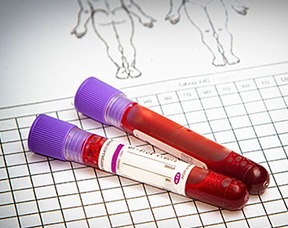Screening refers to testing used to find prostate cancer in men who do not exhibit symptoms of the disease. This is important because screening can help to locate prostate cancer at its earliest stage when it’s much easier to treat. However, various medical organizations don’t seem to agree on the issue of screening or its potential benefits. Some organizations recommend men consider prostate cancer screening in their 50s, while others suggest screening sooner for those who have risk factors for the disease. Regardless of the differences in opinion, discuss your particular situation, the benefits and risks of screening with your doctor. Together, you can decide whether prostate cancer screening is right for you.
Screening Tests
Below are the screening tests used to detect prostate cancer.
PSA Blood Test
PSA is a protein produced by the prostate gland. The test checks for the level of PSA in the blood, since that may rise in men who have prostate cancer. However, an elevated or rising PSA level alone doesn’t always mean that a man has prostate cancer. In fact, most men with a high PSA level don’t have prostate cancer. PSA levels tend to increase with age and may be higher in men with a common, non cancerous condition called benign prostatic hyperplasia (BPH), or another condition called prostatitis, an inflammation of the prostate gland. The results of a PSA test can help a doctor to determine whether to run additional tests to check for prostate cancer.
Digital Rectal Exam (DRE)
Most often, this test is done during an annual physical. The doctor inserts a lubricated, gloved finger into your rectum, to check for hard or lumpy areas in the prostate. However, in most cases, the cancer causes no changes to the gland and a DRE may not be able to detect the cancer. A DRE is useful in ruling out prostate enlargement caused by benign prostatic hyperplasia (BPH), as this causes the gland to feel firm and smooth.
PCA3 Urine Test
This molecular diagnostic test detects RNA from the prostate cancer gene 3 (PCA3), which is secreted in high quantities by prostate cancer cells. The test can help differentiate prostate cancer from other causes of an elevated PSA.
4Kscore Blood Test
This test gives a percentage score of how likely a man, who has an elevated PSA, is to have an aggressive prostate cancer. The results can help the patient and his doctor decide whether or not to do a biopsy depending on the likelihood of a high-risk or low-risk malignancy.


